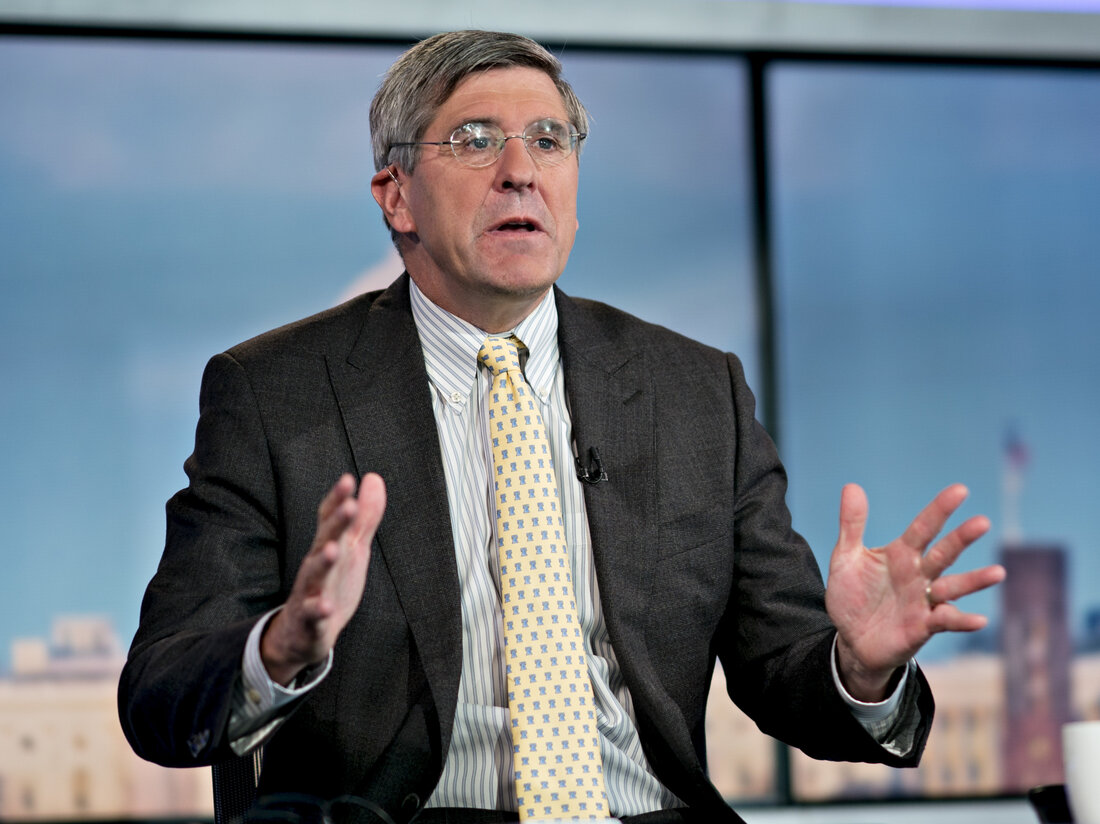In July 2008, as the Fed had for months been rapidly cutting interest rates as the economy weakened into what became the Great Recession, Moore stated, “I happen to believe we should be raising rates, not cutting them.”[21][22]
Moore supports abolishing the income tax, and replacing it with a national sales tax.[23][24]
Moore rejects the scientific consensus on climate change. In 2009, he described climate change as “the biggest scam of the last two decades.”[25] In columns and op-eds, Moore called those with concerns about climate change “Stalinistic” and has accused climate scientists of being part of a global conspiracy to obtain money via research grants.[26][27] In an April 2019 interview, Moore said that the Federal Reserve should not consider the economic impacts of climate change in decision-making.[28]
Moore wrote a 2014 Kansas City Star opinion piece entitled, “What’s the matter with Paul Krugman?,” responding to Krugman’s earlier opinion piece “Charlatans, Cranks and Kansas,” which had discussed a recent major tax cut in Kansas.[29][30] Moore said that job creation had been superior in low-taxation states during the five years ending June 2009 following the recession. After errors were found in Moore’s data, he sought to correct the errors with different data that were also incorrect. Miriam Pepper, editorial page editor for the Star stated “I won’t be running anything else from Stephen Moore.”[31][32]
In a 2014 op-ed in the Washington Times, Moore cited the role of a “culture of virtue” in America’s economic success, writing, “What is irrefutable is that marriage with a devoted husband and wife in the home is a far better social program than food stamps, Medicaid, public housing or even all of them combined.”[33][34]
Moore has often expressed support for some variation of a gold standard. In 2015, he declared, “We have got to get rid of the Federal Reserve and move towards a gold standard in this country!” Few economists support a gold standard.[35][36][37]
During a 2016 debate on the minimum wage, Moore stated, “I’m a radical on this. I’d get rid of a lot of these child labor laws. I want people starting to work at 11, 12.”[38]
Moore served as one of the top economic advisers to Donald Trump’s 2016 presidential campaign.[39] Moore is known to be a strong supporter of President Trump.[40] In 2018, Moore and Laffer wrote the book Trumponomics, in which they lauded the Trump administration’s economic policies[18][41] and criticized the economic performance of the George W. Bush years.[42] Trump endorsed the book in a March 2019 tweet.[43] In the book, Moore and Laffer argue that the Trump administration’s 2017 tax plan would raise GDP growth rates to as much as 6% and not increase budget deficits.[41] In a 2019 review of the book, conservative N. Gregory Mankiw, an economics professor at Harvard University and head of the Council of Economic Advisors under President George W. Bush, described the book as “snake-oil economics,” writing that Moore and Laffer’s analysis was based on “wishful thinking” rather than “the foundation of professional consensus or serious studies from peer-reviewed journals.”[41][44]
Moore asserted in a December 2018 appearance on CNN that the Federal Reserve was causing deflation in the economy, although Commerce Department data showed there was consistent inflation.[45][46][47] In April 2019, Moore asserted deflation was “the whole reason the economy was so poor in late 2018,” although inflation was 2.2% in the fourth quarter of 2018.[48][47]
In September 2018, Moore wrote a Wall Street Journal opinion piece entitled, “The Corporate Tax Cut Is Paying for Itself,” in which he asserted that “faster-than-expected growth has produced a revenue windfall.” Corporate tax receipts for the fiscal year ended September 2018 were down 31% from the prior fiscal year, the largest decline since records began in 1934, except for during the Great Recession when corporate profits, and hence corporate tax receipts, plummeted.[49][50][51][52]
In February 2019, Moore stated, “There’s no bigger swamp in Washington than the Federal Reserve Board. It’s filled with hundreds of economists who are worthless, who have the wrong model in their mind. They should all be, they should all be fired and they should be replaced by good economists.”[53]
Before his nomination to the Federal Reserve Board, in late December 2018 Moore stated, while on a radio talk show, that he believed “the people on the Federal Reserve Board should be thrown out for economic malpractice”.[14]
On March 13, 2019, Moore co-authored a column in the Wall Street Journal which asserted that the Federal Reserve‘s policies were slowing the economy and causing “wild swings in the stock market,” at a time the Dow was up 13% for the year. He also asserted that the Fed should focus more on commodity price changes rather than overall price changes. Larry Kudlow, the Director of the U.S. National Economic Council, showed the article to President Trump, who decided he wanted to place Moore on the Federal Reserve Board.[14][45]
Moore called for higher interest rates when the economy was recovering from the Great Recession under Barack Obama, but has called for lower rates when the economy has fully recovered and continues to grow under Donald Trump.[37] Moore stated in August 2018, “I have to confess: I was wrong about inflation in 2009 and 2010. I thought there would be a lot of inflation with the Fed lowering rates to practically zero, and that was wrong.”[54]
In April 2020, Moore referred to individuals who protested stay-at-home orders during the coronavirus pandemic as “the modern-day Rosa Parks — they are protesting against injustice and a loss of liberties.”[55] He ran a group named Save Our Country, which argued for the reopening of the economy amid the coronavirus pandemic.[56] Moore argued against coronavirus relief in the form of unemployment benefits, arguing that “giving people money” was not an economic stimulus.[57] Moore said, if it were true that it was the stimulus, “we could just give everybody $100,000 and we’d all be rich right? It’s just so stupid.”[57]
In 2023, Moore co-authored the chapter on the Department of the Treasury in the Heritage Foundation’s Project 2025 book, Mandate for Leadership: The Conservative Promise.[58][59]

